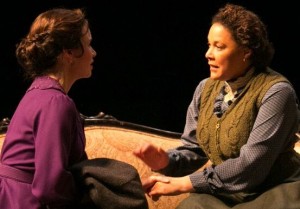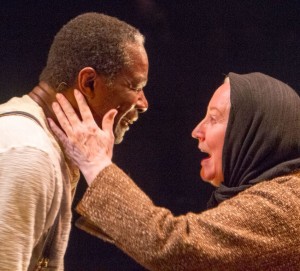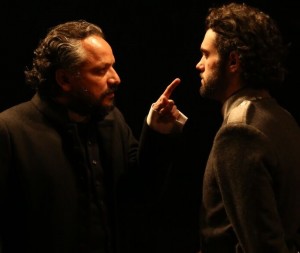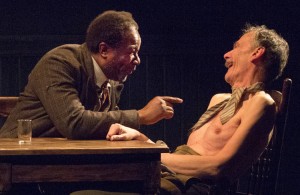John Douglas Thompson and Bill Irwin starring in Samuel Beckett’s tragicomic masterpiece Endgame: it’s hard to imagine a more appealing combination. Thompson is perhaps the greatest classical actor of his generation, and Irwin one of the world’s premier interpreters of Beckett, as anyone who witnessed his master class On Beckett (which, like Endgame, played at the Irish Repertory Theatre) can attest. The production, anchored in two brilliant performances and under Ciarán O’Reilly’s precise and elegantly understated direction, exceeds even lofty expectations, perfectly capturing the play’s absurd, macabre comedy without sacrificing its haunting bleakness.
The Merchant of Venice
When most people think of Shakespeare’s The Merchant of Venice, it's Shylock who springs to mind, not the titular merchant. As a Jew in a Christian city-state, Shylock is an outsider; as a moneylender in an economy that reviles usury, he’s a pariah. Director Arin Arbus has chosen John Douglas Thompson, one of the most accomplished classical actors of his generation, as Shylock in her modern-dress production at Theatre for a New Audience (TFANA). Thompson, reportedly the first Black actor to play Shylock professionally in New York, finds music even in the most acidic passages of the Bard’s rhetoric; his nuanced performance explodes at crucial points, with moral indignation outstripping self-pity.
It’s War
The juxtaposition of two masterpieces by two giants of modern theater on opposite sides of the ever more relevant and explosive issue of gender is a New York theatrical event. Theater for a New Audience has paired Henrik Ibsen’s A Doll’s House with the lesser-known The Father, by August Strindberg, a play written partially in response to the Ibsen play.

Director Arin Arbus and her creative team brilliantly use the same actors in similar roles in both plays and configure the theater at the Polonsky Shakespeare Center in traverse with the audience on two sides of a fairly narrow but long stage. A Doll’s House, first produced in 1887, follows the 1937 Thornton Wilder adaptation. The Father, written in 1887, boasts a newly commissioned translation of from writer and director David Greig.
Both plays tell the story of a marriage that falls apart when a woman takes action on behalf of a husband or child in a world in which the society upholds male prerogatives. The law denies both women scope of action on critical matters in their lives. In The Father, it would deprive Laura (Maggie Lacey), the wife of Captain Adolf, the title character, of any say in the future of her child. In A Doll’s House, it turns Nora’s saving of her husband Thorwald’s life into a criminal act. What will Laura do when the Captain (John Douglas Thompson), her husband, announces his irrevocable decision to send their daughter away to school to become a teacher when she wants Bertha (Kimber Monroe) to remain home and study art? What will happen to Nora when her forgery of a promissory note on a loan is revealed to him just as, inconveniently, he is about to start a new job as the head of a bank?
In both plays the man is the provider, and the husband complains about his wife’s spending his hard-earned money (no concept of an economic partnership here!). Both women must connive to make their marriages work and get what they want, be it the nibble of a macaroon or the destiny of a child. In both, wives get in the way of their husbands’ careers, Laura in misdirecting her husband’s scientific letters detailing hard-won discoveries, and Nora in forging her father’s signature and potentially placing her husband in a compromised situation at his bank. Is it coincidence that the dramatic turning point of each play depends on an act of male violence? In The Father, Captain Adolf throws a lamp at his wife and the resulting fire is a tour de force of staging by Arbus with Riccardo Hernandez’s scenic design. Matters for the Captain devolve from there. In A Doll’s House, the violence is verbal. Thorwald’s berating of Nora when he feels his career and social standing are threatened fires Nora’s decision to leave the confinement of her “doll’s house.” The overlap of the two plays could hardly be more striking.
But that overlap is indeed the point, and it throws the different human, gender, and theatrical visions of the plays into far sharper relief. A Doll’s House is, of course, not just the dramatic rendering and canny analysis of the woman’s situation in the late 19th century; it is a manifesto that speaks boldly even today. When Nora’s husband, Thorwald, defends himself to his wife, saying, “No man sacrifices his honor even for the woman he loves,” and Nora responds, “Millions of women have done it,” the audience at the Polonsky erupted in applause. With humiliating clarity, Nora comes to understand how living in homes run by men has stunted her growth as a human being. “I’ve been living like a beggar, by performing tricks for you!” she tells Thorwald. “You and my father are responsible. It’s your fault my life has been wasted.” Maggie Lacey is commendable in both wife roles, and does especially well with the lighter shades of Nora’s passionate character.
In The Father, the Captain’s human growth has been stunted too, and in a manner parallel to Nora’s, since it is his profound and early attachments to women, plumbed to extraordinary depths in the play and in the harrowing and magnificent performance by Thompson, that undermine and doom him. Thompson’s performances as the husbands are powerful, but the Strindberg provides him with a role of rare emotional range in which he, along with the audience watching him, absolutely revels. The Father is a cri de coeur on behalf of husbands and breadwinners everywhere and the sacrifices that come with that role. At the heart of this painful play is not a heroic vision of manhood but rather a disturbing vision of male weakness. It is out of weakness that the Captain reaches to the law and social norms of male prerogative to counter the will of his determined wife.
At the same time, staging the plays in repertory works to Strindberg’s advantage. The tight construction of The Father, in which the suspicions his wife plants about whether he is Bertha’s father or not drive the Captain to insanity, makes the Ibsen work feel, at moments, contrived, as when Nora’s friend and foil, Mrs. Linden, makes the shocking decision to allow Thorwald to find the damning letter that will reveal Nora’s forgery. The psychological contradictions and depths of Strindberg’s portrayal of the Captain makes Ibsen’s portrayal of Nora's final resolve to leave her husband and two children appear less powerfully motivated by comparison.
At the end of A Doll’s House, there is hope beyond the confines of the performance itself. Nora, who was courageous enough to undertake an extraordinary scheme to save a husband’s life, will surely succeed now that she has made the decision to save her own life. And in the aftermath of battle, there is the possibility of a new woman and new man that will emerge from this process. The same is not true for the more despairing vision of Strindberg, in which the male is fundamentally powerless, and the entire family a rubble of destruction. Tellingly, it is the Captain’s own nanny, Margaret, beautifully played with unexampled tenderness by Laurie Kennedy, who tricks him into the actual straitjacket to which his madness has led him. For the noble Captain, there is no exit. Strindberg’s vision is as dark as Ibsen’s is radical.
Arbus and her marvelous casts invite us to place these plays beside each other and, in so doing, come away with a new understanding, not only of these works, not only of these playwrights, but of ourselves. Can great theater do more?
Theater for a New Audience presents August Strindberg's The Father and Henrik Ibsen's A Doll's House in repertory at the Polonsky Shakespeare Center (262 Ashland Place) in Brooklyn through June 12. Evening performances are at 7:30 p.m. Tuesday through Sunday. Matinees are at 2 p.m. Saturday and Sunday. For tickets, call Ovationtix at (866) 811-4111 or visit www.tfana.org.
Delusions Unto Death
After seeing the Goodman Theatre revival of The Iceman Cometh in Brooklyn, it’s tempting to wonder what Eugene O’Neill would have thought of purveyors of the modern 90-minute intermissionless play. Sloth-ridden pikers, perhaps? O’Neill’s late masterpiece runs four hours and 45 minutes at BAM, and it is surely one of the bleakest plays ever written. Don’t let that put you off, however. Robert Falls’s magnificent production may require a marathon sitting, but it’s worth it.
The setting is 1912, in a combination saloon and rooming house filled with those who have hit rock bottom. The proprietor is Stephen Ouimette’s cantankerous Harry Hope (O’Neill’s sense of irony is not subtle), and the denizens are a collection of drunks, waking up gradually in the gloom. At first Natasha Katz’s remarkable lighting barely registers; then it slowly reveals the tables of inebriates.
The group is awaiting Theodore “Hickey” Hickman (Nathan Lane), whose annual arrival for Harry’s birthday party is imminent. Among those on hand are ex-anarchist Larry Slade (Brian Dennehy); Hugo, a Russian-accented anarchist (Lee Wilkof); Ed Mosher (Larry Heumann Jr.), who is Harry’s brother-in-law and worked for the circus; and Joe Mott (John Douglas Thompson), an ex-gambler on the skids who cleans the bar. Other characters include two Boer War veterans from opposing sides and a correspondent in that war; two bartenders; and a trio of self-styled “tarts.”
During the next 48 hours the last vestiges of hope for any of them are stripped away. Before Hickey’s arrival the burnt-out Larry is approached by Don Parritt (Patrick Andrews), a young man whose mother is a firebrand anarchist more devoted to the movement than to him; Don has always looked up to Larry as a father, but now Larry wants Don to take a powder. Someone has sold out the movement, and Don’s mother has been arrested.
When Hickey shows up, he delivers a shock to the group. He’s no longer a drinker. He has faced himself and he has become an evangelist for truth-telling. The Hickey part doesn’t seem tailored to Nathan Lane’s acknowledged comic brilliance, but Lane not only finds comedy where it isn’t apparent, he proves himself a powerful dramatic actor (to be fair, he has done dramatic parts before, but nothing compared to this). The evangelist’s fire and the do-gooder’s brass, the glad-hander’s cheer and optimism—Lane has them all. He jokes around as a salesman must, and yet he also excoriates the others’ “pipe dreams.” You’ll be sick of that phrase by the end of the evening, with “take a hop off the fire escape” a close second—O’Neill overwrites, but he also supplies plenty of humor, and even the repetition, while trying one’s patience, gathers a cumulative, relentless force.












